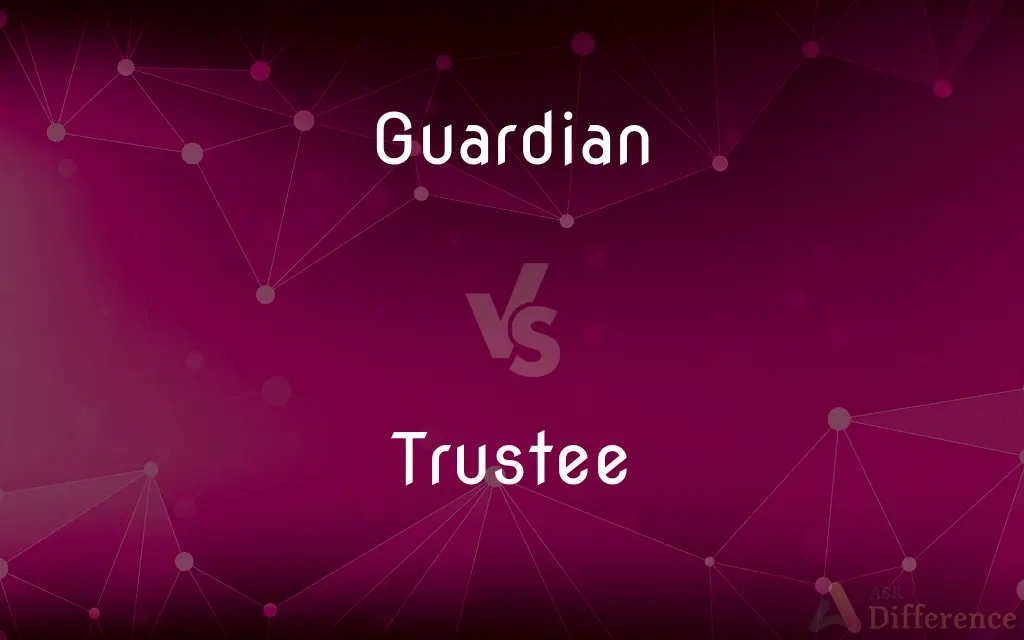Guardian vs. Trustee — What's the Difference?
By Tayyaba Rehman — Published on September 30, 2023
A Guardian is a person legally responsible for the care and well-being of another, usually a minor. A Trustee is a person or entity responsible for managing assets or property held in a trust.

Difference Between Guardian and Trustee
Table of Contents
ADVERTISEMENT
Key Differences
A Guardian is typically someone who has been legally appointed to care for the well-being of another individual, often a child or someone incapable of caring for themselves. A Trustee, on the other hand, is usually responsible for managing assets or property that are held in a trust. The Guardian focuses more on personal care, while the Trustee focuses more on financial matters.
Guardians have a fiduciary duty to act in the best interests of the ward (the person under guardianship). This could include making decisions about education, healthcare, and living conditions. Trustees have a similar fiduciary duty, but it applies to the proper management and distribution of the assets within the trust. Their duty is primarily financial, aimed at either preserving or growing the trust's assets.
Guardianship is generally more comprehensive in its responsibilities, often including both physical and emotional care. Trustee responsibilities are more narrowly defined and focus solely on the management of assets. Guardians usually need to get court approval for major decisions, while Trustees operate based on the stipulations set forth in the trust agreement.
Guardians often have to go through a legal process to be appointed, which may include court hearings and documentation. Trustees are generally appointed through a legal document called a trust agreement. The roles may be temporary or permanent depending on the conditions set forth either by a court or the trust document.
Comparison Chart
Focus
Personal care
Financial management
ADVERTISEMENT
Legal Origin
Court appointment
Trust agreement
Responsibilities
Comprehensive
Narrowly defined
Decision-making
Requires court approval
Based on trust agreement
Nature
Can be temporary or permanent
Usually specified in trust
Compare with Definitions
Guardian
Guardianship may require court approval for major decisions.
The Guardian had to seek court approval to move the child out of state.
Trustee
A Trustee manages assets held in a trust.
He was named the Trustee of his grandmother’s estate.
Guardian
Guardians often focus on personal care.
The Guardian decided to enroll the child in a special education program.
Trustee
Trustees focus on financial responsibilities.
The Trustee made investments to grow the trust fund.
Guardian
Guardians have a fiduciary duty to their wards.
The Guardian invested in a college fund for the child’s future.
Trustee
Trustees operate based on a trust agreement.
The Trustee distributed assets according to the stipulations in the trust agreement.
Guardian
One that guards, watches over, or protects.
Trustee
Trustees also have a fiduciary duty.
The Trustee acted carefully to preserve the value of the trust.
Guardian
One who is legally responsible for the care and management of the person or property of an incompetent or minor.
Trustee
Trustee roles are usually permanent unless specified.
She was made Trustee until the beneficiary turns 30.
Guardian
See guardian ad litem.
Trustee
(Law) The person in a trust relationship who holds title to property for the benefit of another.
Guardian
A superior in a Franciscan monastery.
Trustee
A member of a board elected or appointed to direct the funds and policy of an institution.
Guardian
Someone who guards, watches over, or protects.
Trustee
A country responsible for supervising a trust territory. See Usage Note at -ee1.
Guardian
(legal) A person legally responsible for a minor (in loco parentis).
Trustee
To place (property) in the care of a trustee.
Guardian
(legal) A person legally responsible for an incompetent person.
Trustee
To function or serve as a trustee.
Guardian
A superior in a Franciscan monastery.
Trustee
A person to whom property is legally committed in trust, to be applied either for the benefit of specified individuals, or for public uses; one who is intrusted with property for the benefit of another.
Guardian
(video games) A major or final enemy; boss.
Trustee
A person in whose hands the effects of another are attached in a trustee process.
Guardian
One who guards, preserves, or secures; one to whom any person or thing is committed for protection, security, or preservation from injury; a warden.
Trustee
(transitive) To commit (property) to the care of a trustee.
To trustee an estate
Guardian
One who has, or is entitled to, the custody of the person or property of an infant, a minor without living parents, or a person incapable of managing his own affairs.
Of the several species of guardians, the first are guardians by nature. - viz., the father and (in some cases) the mother of the child.
Trustee
(transitive) To attach (a debtor's wages, credits, or property in the hands of a third person) in the interest of the creditor.
Guardian
Performing, or appropriate to, the office of a protector; as, a guardian care.
Trustee
A person to whom property is legally committed in trust, to be applied either for the benefit of specified individuals, or for public uses; one who is intrusted with property for the benefit of another; also, a person in whose hands the effects of another are attached in a trustee process.
Guardian
A person who cares for persons or property
Trustee
To commit (property) to the care of a trustee; as, to trustee an estate.
Guardian
Providing protective supervision; watching over or safeguarding;
Daycare that is educational and not just custodial
A guardian angel
Tutelary gods
Trustee
To attach (a debtor's wages, credits, or property in the hands of a third person) in the interest of the creditor.
Guardian
A Guardian is legally responsible for another's well-being.
She was appointed the Guardian of her younger brother.
Trustee
A person (or institution) to whom legal title to property is entrusted to use for another's benefit
Guardian
Guardianship can be temporary or permanent.
She was made a temporary Guardian until the parents could care for the children.
Trustee
Members of a governing board
Common Curiosities
Can a Guardian be a Trustee?
While rare, it is possible for someone to be both a Guardian and a Trustee.
Is a Trustee concerned with personal well-being?
A Trustee’s main concern is the financial management of trust assets, not personal care.
Do Guardians need to make reports?
Guardians often must provide regular reports to the court.
How is a Trustee chosen?
Trustees are appointed through a trust agreement.
Can a Guardian manage assets?
A Guardian may manage assets if authorized, but their primary role is personal care.
What is a Guardian?
A Guardian is someone legally responsible for the well-being of another person.
How is a Guardian appointed?
Guardians are usually appointed through a legal process involving court approval.
Do Trustees have a fiduciary duty?
Yes, Trustees have a fiduciary duty to manage the trust responsibly.
What is a Trustee?
A Trustee is someone responsible for managing assets held in a trust.
Are Trustees accountable for their actions?
Yes, Trustees are accountable for managing the trust’s assets responsibly.
Do Trustees have set guidelines for action?
Trustees act based on the stipulations set forth in the trust agreement.
Can Guardianship be temporary?
Guardianship can be either temporary or permanent, depending on court orders.
Can a Trustee be a corporation?
Yes, a Trustee can be an individual or a corporate entity.
Do Guardians require court approval for decisions?
Often, Guardians require court approval for significant decisions concerning the ward.
Is a Trustee’s role generally temporary?
A Trustee’s role is usually permanent unless otherwise specified in the trust agreement.
Share Your Discovery

Previous Comparison
Have To vs. Has To
Next Comparison
Shoarma vs. ShawarmaAuthor Spotlight
Written by
Tayyaba RehmanTayyaba Rehman is a distinguished writer, currently serving as a primary contributor to askdifference.com. As a researcher in semantics and etymology, Tayyaba's passion for the complexity of languages and their distinctions has found a perfect home on the platform. Tayyaba delves into the intricacies of language, distinguishing between commonly confused words and phrases, thereby providing clarity for readers worldwide.













































